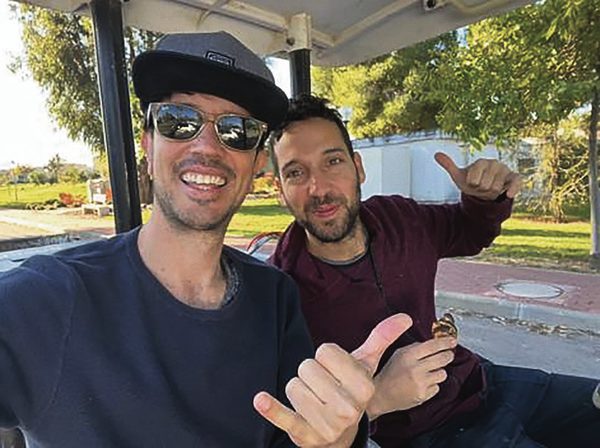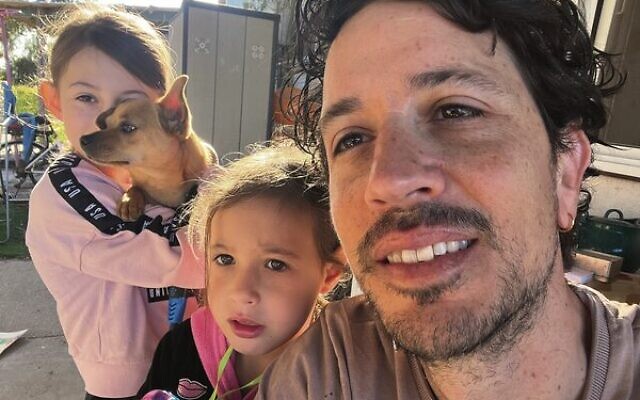Kfar Aza survivor recounts October 7 ordeal
“You start to get pieces of information and then I started to understand what a disaster we had experienced or survived, and it goes on and on, even today,” Eilon Kotlerof.
“I am feeling lucky but also crying every day. People that you would meet every day, they are gone,” Eilon Kotler, from Kibbutz Kfar Aza, told The AJN by phone from Israel this week ahead of his visit to Australia.
Kotler’s family are founding members of Kfar Aza, which predates the establishment of the State of Israel. Most of his family were still living there prior to October 7, when Hamas terrorists breached the Gaza border fence and rampaged through southern Israel, killing 1200 people – mostly civilians – and taking more than 240 hostage.
The previous evening, Kotler recalls, he had guests staying at the kibbutz from central Israel.
“We did many activities with the kids. It was very peaceful. We had Friday evening dinner outdoors, a picnic,” he said.
“Then my [nine-year-old] daughter asked to go to my sister, they had a pyjama party. I stayed with my younger daughter, who is six years old.”
The two slept in the bomb shelter, which is also his younger daughter’s bedroom.
When the first red alert came on Saturday morning, he thought it was lucky he had slept there and assumed the rocket salvo would soon be over.
But soon, he said, it “felt like hundreds of rockets” were raining down. His guests joined him and his daughter in the shelter, as due to the proximity of the kibbutz to Gaza, there is only 15 seconds to seek shelter after a rocket warning.
“I started to get the messages from the community that we have to stay in the shelters, be quiet, but no one mentioned the terror attack,” he said. “We got also a picture of our kids from the pyjama party … and we felt like a relief.”
At 9am, after two-and-a-half hours in the shelter, they got the first message mentioning a terrorist infiltration. “My worst nightmare, something that I can’t imagine. But when you hear those kinds of words, you imagine one terrorist, two terrorists, not 300 terrorists,” he said. “When I got out I understood the enormous number, so I am thankful that I didn’t know the situation at the time.
“After a few minutes I got the message that my friend Ofir Libstein, the head of the Regional Council of Sha’ar Ha’Negev, was murdered when trying to protect his house from the terrorists. I understood that something wrong is happening and this is not the end.”
At 10am they got a message from Kotler’s brother-in-law saying, “They are behind our door, the terrorists are here, please help us.”
“I was thinking to myself, they’re going to open the door and slaughter the whole family,” he recalled. “I wasn’t worried for myself. Our energy was focused on them. I’m not Orthodox but I prayed.
“I was very nervous but I knew that my young daughter is looking at my reaction so it’s better to be calm.”
There was no communication with the house with the pyjama party. “But after a few hours they messaged again, ‘They are here, save us, please send someone.’
“Around eight o’clock [pm], finally the miracle has arrived, I don’t know how you describe it. We got the message the army reached the house,” he said. “Till then I just held my breath for about five hours.”
At around 2am, soldiers also arrived at Kotler’s house and evacuated him, his daughter and their guests. His sister in Portugal had contacted Israeli news anchor Lucy Aharish, whose husband Tsahi Halevi is an actor in the television show Fauda. In a case of life imitating art, Halevi was among the troops who went to Kfar Aza and rescued Kotler.
As they left the house walking in a line, Kotler said, “I knew that in some houses there were bodies, and friends I grew up with, their child was dead over there, and some of the houses were totally burned.
“And I remember my daughter, she’s holding my hand hard and telling me ‘Abba, don’t look. Let’s go, don’t look.’
“It was devastating, it was all destruction, so sad. It was like a dream that collapsed.”

The group ran under rocket fire for the last mile to safety.
“And then we met our community. We started to hug each other,” he said.
While hugging, residents told each other about friends who have been killed and the children who had been kidnapped to Gaza.
“You start to get pieces of information and then I started to understand what a disaster we had experienced or survived, and it goes on and on, even today,” he said.
He explained the kibbutz is like a “big tribe”.
“We grew up together, it’s a small community around 900 people. We couldn’t in our worst nightmares imagine that something like this will happen,” he said.
Kotler’s best friend from the kibbutz, Nadav Amikam, was among those killed.
“He looks a bit like me, he’s got curly hair. We used to go out sometimes to party, he was a teacher at the Anthroposophical Rudolf Steiner School, our daughters are the same age.
“Nadav was in the community force and they were the first to respond to the terrorist attack, but they had no chance,” he said.
“Now when I visit Kibbutz Shefayim – all the community are staying there – I see his son and daughter and they look lost. They need their father.”
Kotler said he has many photos of his fallen friend of his mobile phone. “This is the way that his son, who is two years old, will know his father,” he said.
“There are many stories like Nadav.”
A month later, he said, “We are starting to understand that these people are not coming back. Also you know it’s like an open wound … all the information about the hostages is just making the wound alive.
“I’m thinking about them in dark tunnels, without food, they probably think that nobody is thinking about them now because there is all war around them, and it won’t be over until they get back.”
He also recalled having to tell his older daughter that her best friend from school had been kidnapped along with her mother and two brothers, while his father had been killed.
“Every day she asks, ‘Is he alive, did you hear something about it?’” he said.
“My younger daughter, a few days ago watched a Disney film about an orphan and she told me it’s the same like her friend. Now she knows her best friend is orphaned. And it goes on and on.”
As he prepares to travel to Australia, Kotler said he feels the support from Jewish people around the world “and I want to give them a big hug”.
“We are brothers,” he said. “Every Jew around the globe now is under attack and I want to give them a hug, to tell them that Israel is our shelter.”
Kotler will speak at an Eastern Suburbs location in Sydney on Sunday, November 19 at 4:30pm. For tickets: events.humanitix.com/zcnsw-voices
He will also be speaking at Beth Weizmann on Tuesday, November 28 at 7.30pm. Bookings: trybooking.com/CNIX and trybooking.com/CNIX


comments